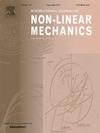Physics-informed neural network for random response evaluation
IF 3.2
3区 工程技术
Q2 MECHANICS
International Journal of Non-Linear Mechanics
Pub Date : 2025-05-06
DOI:10.1016/j.ijnonlinmec.2025.105141
引用次数: 0
Abstract
In this paper, we propose a physics-informed neural network algorithm (PINN) to solve Fokker–Planck–Kolmogorov (FPK) equations for stochastic dynamical systems. The primary innovation of our approach lies in decomposing the solution of the FPK equations into two components: the probability density function (PDF) of the associated degenerate systems, derived from prior knowledge, and a modified component expressed in exponential form. This decomposition provides several advantages. First, the normalization condition as a supervisory criterion to prevent a zero solution is unnecessary, which reduces computational costs during the gradient descent iteration process, particularly in high-dimensional systems. Second, this approach accommodates uneven sample points. Third, the boundary condition is automatically satisfied. We present numerical examples to demonstrate the effectiveness of the proposed physics-informed neural networks. By utilizing 2- or 3-dimensional systems as examples, comparisons with exact solutions and results from Monte Carlo simulations show strong agreement, indicating that the physics-informed neural networks can solve the Fokker-Planck-Kolmogorov (FPK) equation with high precision. We believe this method can effectively address the FPK equation for various random dynamical systems.
随机响应评价的物理信息神经网络
本文提出了一种基于物理信息的神经网络算法(PINN)来求解随机动力系统的Fokker-Planck-Kolmogorov (FPK)方程。我们方法的主要创新在于将FPK方程的解分解为两个组成部分:相关退化系统的概率密度函数(PDF),源自先验知识,以及以指数形式表示的修改组件。这种分解提供了几个优点。首先,不需要将归一化条件作为防止零解的监督准则,这减少了梯度下降迭代过程中的计算成本,特别是在高维系统中。其次,这种方法可以适应不均匀的样本点。第三,自动满足边界条件。我们给出了数值例子来证明所提出的物理信息神经网络的有效性。以二维或三维系统为例,与精确解和蒙特卡罗模拟结果的比较显示出很强的一致性,表明物理信息神经网络可以高精度地求解Fokker-Planck-Kolmogorov (FPK)方程。我们相信这种方法可以有效地求解各种随机动力系统的FPK方程。
本文章由计算机程序翻译,如有差异,请以英文原文为准。
求助全文
约1分钟内获得全文
求助全文
来源期刊
CiteScore
5.50
自引率
9.40%
发文量
192
审稿时长
67 days
期刊介绍:
The International Journal of Non-Linear Mechanics provides a specific medium for dissemination of high-quality research results in the various areas of theoretical, applied, and experimental mechanics of solids, fluids, structures, and systems where the phenomena are inherently non-linear.
The journal brings together original results in non-linear problems in elasticity, plasticity, dynamics, vibrations, wave-propagation, rheology, fluid-structure interaction systems, stability, biomechanics, micro- and nano-structures, materials, metamaterials, and in other diverse areas.
Papers may be analytical, computational or experimental in nature. Treatments of non-linear differential equations wherein solutions and properties of solutions are emphasized but physical aspects are not adequately relevant, will not be considered for possible publication. Both deterministic and stochastic approaches are fostered. Contributions pertaining to both established and emerging fields are encouraged.

 求助内容:
求助内容: 应助结果提醒方式:
应助结果提醒方式:


